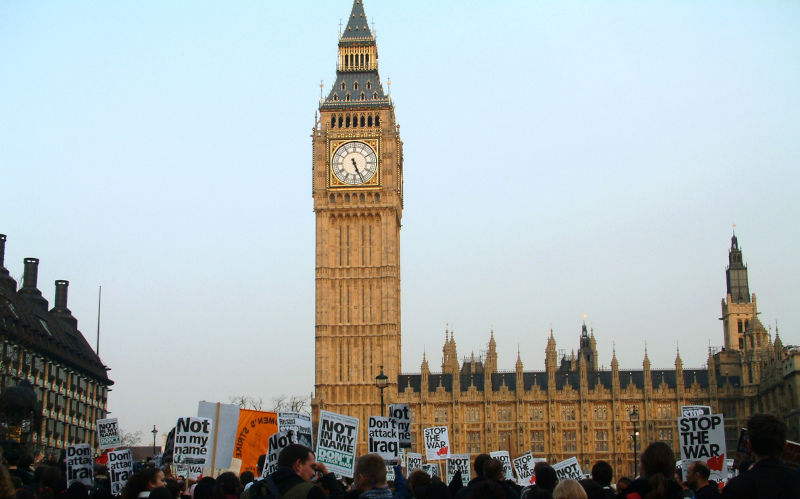“What sort of country locks people away for years for planning a peaceful demonstration?”
July 26, 2024
In recent times, rights of protest have faced crackdowns throughout Europe.
In the United Kingdom, for example, the former Conservative government of Boris Johnson enacted the Police, Crime, Sentencing and Courts Act in 2022, which caused alarm throughout civil society. It was opposed by the Labour Party, led then, as now, by Sir Keir Starmer. It introduced the offence of intentionally or recklessly causing a public nuisance (s.78), widely condemned as draconian. As it is punishable with 10 years’ imprisonment and a fine, there was apprehension over how the offence would be deployed, but all is now clear.
On July 18, five eco-activists from the Just Stop Oil campaign group, which, because of its environmental impact, campaigns for an end to new oil and gas exploration in the North Sea, were convicted of conspiring to block traffic on the M25 motorway in November 2022. The activists used Zoom to recruit volunteers to assist them with their plan, which included climbing motorway gantries at strategic points. Although Judge Christopher Hehir acknowledged that “at least some of the concerns motivating you are, at least to some extent, shared by many”, he told the defendants their offending was “very serious indeed and lengthy custodial sentences must follow”.
Whereas Roger Hallam, the co-founder of Extinction Rebellion, was given an unprecedented sentence of five years’ imprisonment, his four co-defendants each received four years’ imprisonment. These were the longest sentences imposed in living memory for a nonviolent protest, and there was outrage, both locally and internationally.
The sentences sent out a chilling message to anybody thinking about a peaceful protest, and exceeded anything generally imposed in other common law jurisdictions for protest-related criminality (including Hong Kong).
The Greenpeace UK program director, Amy Cameron, asked, “What sort of country locks people away for years for planning a peaceful demonstration?” and added that the sentences were “the culmination of years of repressive legislation”.
Within the governing Labour Party, there was also disquiet. Its former justice secretary, Lord (Charles) Falconer, said he felt “uncomfortable” with long sentences for people who were not “violent criminals”. And the veteran Labour parliamentarian (and Mother of the House of Commons), Diane Abbott, condemned “a draconian approach to civil disobedience”.
The UK government’s former chief scientific adviser, Sir David King, was also appalled. He said, “This is so disgraceful,” and hoped the new Labour government would “change the situation in our courts”.
Even harsher criticism came from the United Nations special rapporteur on environmental defenders under the Aarhus Convention, Michel Forst, who attended part of the trial. He called it “a dark day for peaceful environmental protest”, adding that the sentences “should shock the conscience of any member of the public”. He said the sentences “set a very dangerous precedent”, and put everybody “on high alert on the state of civic rights and freedoms in the United Kingdom”.
The Labour Party backer, Dale Vince, the green energy tycoon who donated 1 million pounds ($1.29 million) to the party earlier this year, went further. Having described the sentences as “harsh” and “undemocratic”, he called on the new Labour government to “intervene because it is an injustice to give four or five years to people who simply protest”.
However, despite the outcry, the new prime minister, Sir Keir Starmer, refused to get involved, pointing out that the sentences were imposed by an independent judiciary (and may be subject to appeal). He also made clear there will be no change to the protest laws for the time being. This meant he would be amending neither the Police, Crime, Sentencing and Courts Act 2022, nor its ugly sister, the Public Order Act (POA) (as amended in 2023).
The POA provides the police with wide powers to impose conditions if a protest could, in their opinion, cause “more than minor” disruption. Although rights activists are now challenging this opaque provision in the courts, given that it can be arbitrarily used to clamp down on almost any type of public protest, the POA gives the police the right to stop and search people without suspicion, which is no less objectionable.
Whatever the justifications there may be for the UK’s aggressive clampdown on public protest rights, its politicians are in no position to lecture others on their approaches to policing protests.
This, however, did not prevent the former British foreign secretary, Lord (David) Cameron, from maligning Hong Kong over its controls on public protests in the UK’s latest six-monthly report on the city issued on April 15 and covering the period July to December 2023.
Although fundamental rights are constitutionally guaranteed in Hong Kong by the Basic Law, including freedom of expression, Cameron claimed that the National Security Law for Hong Kong (2020) was eroding “rights and freedoms in Hong Kong significantly”. The authorities were curtailing “fundamental freedoms”, including freedom “of assembly and of association”.
Given the UK’s curbs on rights of assembly and association in 2022-23, Cameron’s comments beggared belief. They were shameful and trashed the Foreign Office’s credibility. It was a classic instance of the pot calling the kettle black, and it must be hoped that the UK consul general in Hong Kong, Brian Davidson, was not complicit. He is hopefully as disgusted as everybody else by Cameron’s hypocrisy and should seek to avoid any repetition.
However, Cameron and his government are now on the scrap heap of history, and a fresh start is possible. Although he could never get his head around it, honesty always trumps propaganda in the Anglo-Chinese relationship. His successor, David Lammy, now has the opportunity to end the double standards and recalibrate British foreign policy, and he will hopefully grab it with both hands.
Republished from China Daily, Hong Kong. July 24, 2024

